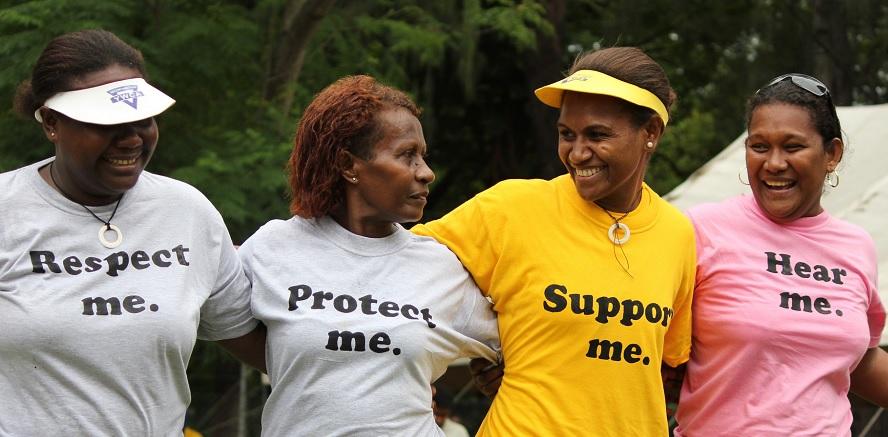
This article is part of a series on women, peace and security that The Strategist will be publishing over coming weeks in recognition of International Women’s Day 2019.
Australia has played a key role in promoting the United Nations women, peace and security (WPS) agenda, including during its two-year term on the UN Security Council (2013 and 2014). We have the potential to play a leading part again ahead of the 20-year anniversary of Security Council resolution 1325 in 2020.
The Department of the Prime Minister and Cabinet is running consultations now on Australia’s second national action plan (NAP) on WPS, to be released by mid-2019. The departments of Defence and Foreign Affairs and Trade have key responsibilities under the current plan.
The first NAP was linked to our campaign for Security Council membership with the slogan ‘Australia: We do what we say’. We now need to extend this legacy and speak to the priorities for the region set out in the 2017 foreign policy white paper. The new slogan should be ‘We listen to local women’s voices’. We should focus on Pacific nations and align our actions with our commitments as a member of the UN Human Rights Council.
We have also commenced the ‘Pacific pivot’, which Prime Minister Scott Morrison announced in November 2018. While the 2017 white paper laid out a long overdue step-up in engagement with the Pacific, it was China’s increasing influence in the region that leant a sense of urgency and scale to the Pacific pivot announcement.
The announcement includes $2 billion of new funding for infrastructure, and $1 billion for enticing Australian businesses to invest in the region, adding five new diplomatic missions, enhancing labour mobility opportunities and creating an ‘office of the Pacific’ with whole-of-government oversight.
These goals must be pursued in a spirit of true partnership. Pacific researcher Tess Newton Cain points out that Australia’s announcements often fail to strike the right tone of respect and partnership.
The second NAP provides an opportunity to model a respectful partnership. One event with clear implications for WPS is the Bougainville referendum. The date of the poll is still uncertain (but likely to be 17 October 2019). The women of Bougainville have much at stake in this referendum and deserve a clear voice and material support for their participation and personal security. Their views on justice for past violations also need to be heard.
Australia should announce that the second NAP will include deep in-country consultations with women’s organisations and peace workers in the Indo-Pacific region about the NAP and about their views of threats to peace and security. Further options for Bougainville include sending a high-profile all-women observer delegation or funding a women’s situation room.
Precedents for such an exercise can be found in other countries. The UK approach is to adapt WPS principles to the context in nine focus countries: Afghanistan, Democratic Republic of Congo, Iraq, Libya, Myanmar, Nigeria, Somalia, South Sudan and Syria.
In the first UK NAP, UK non-government organisations led in-country consultations in the focus countries and reported back to the Foreign Office. In the second NAP, the Foreign Office was given the lead on in-country consultations. It reports annually to parliament on the activities undertaken and results achieved in each of the focus countries. The current NAP commits the UK to a partnership approach:
We will strengthen existing links with local organisations, including women’s rights organisations, building their capacity and ensuring that our work is based on local leadership and needs. Where partners face specific risks on the ground, including gender-based vulnerabilities, we will apply existing risk management processes to mitigate these.
Australia should set focus countries (such as Myanmar, Afghanistan, Cambodia, Philippines, Fiji, Papua New Guinea, Bougainville, East Timor and Indonesia) and release context papers for each (along the lines of the ASEAN WPS dialogue paper, for example).
Australia should conduct in-country consultations where participation from regions to capital is funded. The government should also:
- appoint a special envoy on WPS, such as former minister Julie Bishop, or use the role of ambassador for women and girls to ensure WPS is a key priority and focus and reflects the consultations in high-level diplomacy
- expand on Australia’s ASEAN WPS initiative and host a regional women’s conference to ensure Pacific women’s voices feed into the global advocacy efforts leading up to 2020 and the 20th anniversary of resolution 1325
- incorporate the rights of Indo-Pacific women and their organisations as central pillars of Australia’s diplomatic efforts
- fund Australian NGOs to work with local partners
- provide an annual report to parliament on activities and results in focus countries.
Australia’s diplomatic posts should explore risk-management strategies for local peace organisations and implement strategies for human rights defenders as set out in Human Rights Council guidance.
The benefits of such an approach would be better outcomes for women in conflicts and disasters, as well as in post-conflict transitions. It should also lead to better forecasting of issues, particularly around scheduled events such as elections or referendums. Most importantly, we might listen and learn.